NEWS ROUNDUP
Kaiser strike ● Seattle Protects Women ● UAW members want their due
Tuesday, September 17, 2019
KAISER STRIKE
► In today’s Columbian — Kaiser Permanente workers to strike Oct. 14 — More than 80,000 Kaiser Permanente workers will hold a weeklong nationwide strike beginning Oct. 14, in response to what the group characterized as Kaiser’s unfair labor practices. More than 6,600 workers are expected to be impacted in Oregon and Washington.
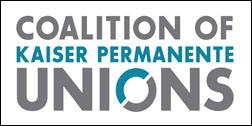 ► From Salon — Kaiser healthcare workers plan for nation’s largest strike since 1997 — Kaiser Permanente’s emergency medical technicians, nurses, respiratory therapists and other staffers are threatening to walk out of work next month, in what could be the nation’s largest strike since 1997. The authorization to strike, approved by 98% of the union members who voted, does not mean a walk out will happen, but it does allow union leaders to call one, giving them leverage ahead of negotiations with the California-based health care giant. Kaiser Permanente, comprised of 39 hospitals and nearly 700 medical officers, serves more than 12 million members in seven states across the country (including Washington).
► From Salon — Kaiser healthcare workers plan for nation’s largest strike since 1997 — Kaiser Permanente’s emergency medical technicians, nurses, respiratory therapists and other staffers are threatening to walk out of work next month, in what could be the nation’s largest strike since 1997. The authorization to strike, approved by 98% of the union members who voted, does not mean a walk out will happen, but it does allow union leaders to call one, giving them leverage ahead of negotiations with the California-based health care giant. Kaiser Permanente, comprised of 39 hospitals and nearly 700 medical officers, serves more than 12 million members in seven states across the country (including Washington).
 ► In the LA Times — 80,000-plus Kaiser workers may strike Oct. 14, but talks continue — Kaiser Permanente Chief Executive Bernard J. Tyson issued a statement complaining that the union was setting a strike date despite active negotiations Monday as “an overt effort to gain leverage in bargaining.”
► In the LA Times — 80,000-plus Kaiser workers may strike Oct. 14, but talks continue — Kaiser Permanente Chief Executive Bernard J. Tyson issued a statement complaining that the union was setting a strike date despite active negotiations Monday as “an overt effort to gain leverage in bargaining.”
EDITOR’S NOTE — For the latest updates, visit the Coalition of Kaiser Permanente Unions website, like them on Facebook, or follow them on Twitter @UnionCoalition.
LOCAL
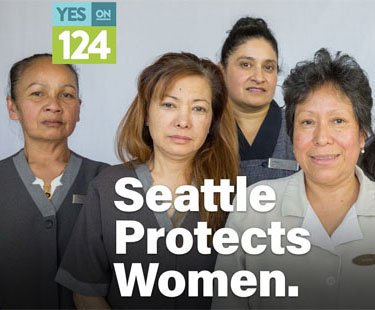 ► In today’s Seattle Times — Seattle council adopts hotel-worker protections after voter-approved law was nixed in court — The Seattle City Council voted unanimously Monday to adopt hotel-worker protections meant to replace and improve on a voter-approved law that was struck down in court last year. Like Initiative 124, which was invalidated because of the way the ballot measure was written, Monday’s ordinances restrict the area that workers can be made to clean in a day while requiring hotels to provide workers with emergency panic buttons, help them pay for health care and retain them during ownership changes. Unlike I-124, the new ordinances include no provision requiring hotels to keep lists of guests accused of assaulting or harassing workers and to bar those guests in certain circumstances.
► In today’s Seattle Times — Seattle council adopts hotel-worker protections after voter-approved law was nixed in court — The Seattle City Council voted unanimously Monday to adopt hotel-worker protections meant to replace and improve on a voter-approved law that was struck down in court last year. Like Initiative 124, which was invalidated because of the way the ballot measure was written, Monday’s ordinances restrict the area that workers can be made to clean in a day while requiring hotels to provide workers with emergency panic buttons, help them pay for health care and retain them during ownership changes. Unlike I-124, the new ordinances include no provision requiring hotels to keep lists of guests accused of assaulting or harassing workers and to bar those guests in certain circumstances.
 ► From Crosscut — Seattle City Council passes new protections for hotel workers over industry objections — Despite pushback from hotel industry representatives and some business owners, the Seattle City Council on Monday passed a suite of new rules intended to improve working conditions for hotel workers in Seattle. “We’re talking about basic protections that we want to make sure every worker has in every industry,” said Councilmember Teresa Mosqueda, who has led the effort to pass the new legislation.
► From Crosscut — Seattle City Council passes new protections for hotel workers over industry objections — Despite pushback from hotel industry representatives and some business owners, the Seattle City Council on Monday passed a suite of new rules intended to improve working conditions for hotel workers in Seattle. “We’re talking about basic protections that we want to make sure every worker has in every industry,” said Councilmember Teresa Mosqueda, who has led the effort to pass the new legislation.
► In today’s Seattle Times — Seattle is considering a plan to set minimum pay for Uber and Lyft drivers — Along with a potential tax on Uber and Lyft rides, Seattle Mayor Jenny Durkan’s office is considering legislation aimed at bolstering the rights of drivers who use the apps, including possibly setting minimum pay.
► In today’s Spokesman-Review — City Council overrides mayor’s veto regarding how city employees are loaned to other agencies — The Spokane City Council swiftly overrode Mayor David Condon’s veto of a law that will regulate the loaning of city employees and property to outside agencies. The veto, announced by Condon on Monday morning and unanimously overridden on Monday evening, is the latest dispute between Condon and the council regarding the city’s contributions to regional collaborations.
BOEING
► From the AP — FAA chief says he’ll test Boeing’s MAX changes this week — The nation’s top aviation regulator says he plans to go into a flight simulator and personally test changes that Boeing is making to the grounded 737 Max. Stephen Dickson also said Monday that he expects Boeing to submit its safety analysis of changes to the plane “in the coming days.”
UAW STRIKE
► In today’s Detroit News — GM strike Day 2: Negotiations to resume
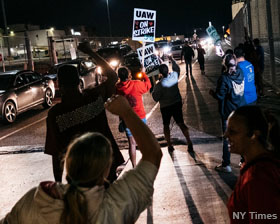 ► In today’s NY Times — GM workers say they sacrificed, and now they want their due — A decade ago, when General Motors was on the brink of collapse and was ushered into bankruptcy by the federal government, the company’s unionized workers bore a significant portion of the pain to bring the automaker back to financial health… The bitter medicine helped reinvigorate the automaker, and for the last several years it has been reaping record profits. Along the way, it has pared its United States payrolls, closed several plants and moved more work to Mexico. Now nearly 50,000 workers have walked off the job at more than 50 G.M. plants and other locations across the Midwest and South, striking to get what they see as their fair share of the company’s hefty returns and block further erosion of their ranks.
► In today’s NY Times — GM workers say they sacrificed, and now they want their due — A decade ago, when General Motors was on the brink of collapse and was ushered into bankruptcy by the federal government, the company’s unionized workers bore a significant portion of the pain to bring the automaker back to financial health… The bitter medicine helped reinvigorate the automaker, and for the last several years it has been reaping record profits. Along the way, it has pared its United States payrolls, closed several plants and moved more work to Mexico. Now nearly 50,000 workers have walked off the job at more than 50 G.M. plants and other locations across the Midwest and South, striking to get what they see as their fair share of the company’s hefty returns and block further erosion of their ranks.
► In today’s NY Times — The autoworkers strike is bigger than GM (by Steven Greenhouse) — How teachers, hotel workers and supermarket cashiers inspired 50,000 General Motors workers to go on strike.
► From the WSJ — With no vehicles being made, UAW strike could cost GM $100 million a day
► In the Detroit News — GM strike lasting more than a week could send Mich. into recession
► In the Detroit Free Press — GM CEO Mary Barra’s compensation was $21.87 million in 2018, 281 times median GM worker
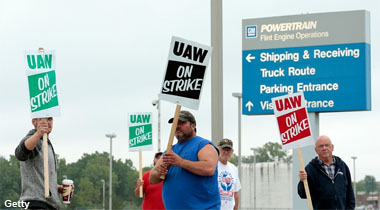 ► From Market Watch — Why the striking workers at General Motors are so extraordinary — The Bureau of Labor Statistics has long been counting work stoppages, which include strikes and lock outs. In 1969, there were 412 work stoppages involving at least 1,000 workers. In 2018, there were just 20 — and that was a jump from 7 stoppages the year before. In fact, this is the UAW’s first national strike since a two-day walk out in 2007. There were 21 work stoppages that year. The new UAW strike wasn’t a light decision, according to the union’s vice president, Terry Dittes. “We clearly understand the hardship that it may cause,” he said. “We are standing up for fair wages, we are standing up for affordable quality health care, we are standing up for our share of the profits.”
► From Market Watch — Why the striking workers at General Motors are so extraordinary — The Bureau of Labor Statistics has long been counting work stoppages, which include strikes and lock outs. In 1969, there were 412 work stoppages involving at least 1,000 workers. In 2018, there were just 20 — and that was a jump from 7 stoppages the year before. In fact, this is the UAW’s first national strike since a two-day walk out in 2007. There were 21 work stoppages that year. The new UAW strike wasn’t a light decision, according to the union’s vice president, Terry Dittes. “We clearly understand the hardship that it may cause,” he said. “We are standing up for fair wages, we are standing up for affordable quality health care, we are standing up for our share of the profits.”
► From Politico — Democratic candidates support United Auto Workers (video)
THAT WASHINGTON
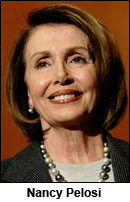 ► From Politico — House Democrats sidestep border wall fight until November — House Democrats have largely agreed to punt an ugly border wall fight with Trump until November, likely averting a shutdown this month — as long as the president backs the plan. The House is expected to pass a stopgap funding bill this week that maintains the status quo for Trump’s border policies, marking a temporary concession by progressives still fuming at recent hard-line moves on immigration, according to multiple lawmakers and senior aides.
► From Politico — House Democrats sidestep border wall fight until November — House Democrats have largely agreed to punt an ugly border wall fight with Trump until November, likely averting a shutdown this month — as long as the president backs the plan. The House is expected to pass a stopgap funding bill this week that maintains the status quo for Trump’s border policies, marking a temporary concession by progressives still fuming at recent hard-line moves on immigration, according to multiple lawmakers and senior aides.
► In the Washington Post — The USMCA is bad for workers (letter by Ohio AFL-CIO President Tim Burga) — For more than 25 years, we have suffered from lost jobs and lower wages because of “free trade” deals that place the interests of multinational corporations over those of workers and the environment. Congress should oppose the new NAFTA until it fixes what is wrong with the current one.
ALSO at The Stand — Without fixes, AFL-CIO must oppose USMCA (new NAFTA)
 ► From ProPublica — Trump’s NLRB, trying to cut protections for millions of temps and fast-food workers, trips up again — Under the Trump administration, the NLRB has been trying to roll back an Obama-era decision that made companies more responsible for temporary staffers, fast-food-franchise workers and others who work for them indirectly. The first attempt was foiled in early 2018 when a Trump appointee to the board was found to have a conflict of interest. Now, as the NLRB tries to undo the rule for a second time, it’s facing questions from two Democratic representatives about another potential conflict of interest — and this one involves the NLRB’s own use of temporary staffers. In May, the labor board engaged a company called Ardelle Associates to supply lawyers and paralegals to help review public comments on the proposed overhaul of the provision in question, which is known as the “joint-employer rule.”
► From ProPublica — Trump’s NLRB, trying to cut protections for millions of temps and fast-food workers, trips up again — Under the Trump administration, the NLRB has been trying to roll back an Obama-era decision that made companies more responsible for temporary staffers, fast-food-franchise workers and others who work for them indirectly. The first attempt was foiled in early 2018 when a Trump appointee to the board was found to have a conflict of interest. Now, as the NLRB tries to undo the rule for a second time, it’s facing questions from two Democratic representatives about another potential conflict of interest — and this one involves the NLRB’s own use of temporary staffers. In May, the labor board engaged a company called Ardelle Associates to supply lawyers and paralegals to help review public comments on the proposed overhaul of the provision in question, which is known as the “joint-employer rule.”
EDITOR’S NOTE — That’s right. The Republican NLRB has hired a temp agency to help it remove protections for temp workers (among others).
► In today’s Washington Post — Transportation Secretary Elaine Chao faces investigation over ethics allegations — The House Oversight and Reform Committee’s sweeping request for documents follows growing scrutiny of whether Chao used her position to help a New York-based shipping company owned by her father and sisters gain favor with the Chinese government.
NATIONAL
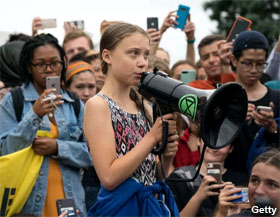 ► From Vox — Greta Thunberg is leading kids and adults from 150 countries in a massive Friday climate strike — Young people from around the world are leading a massive coordinated strike from school on Friday, September 20, to protest government and business inaction on climate change. It is likely to be one of the largest environmental protests in history. The New York strike is expected to attract thousands of people, and parallel strikes in DC, Boston, Seattle, Minneapolis, Miami, Los Angeles, and Denver may, too.
► From Vox — Greta Thunberg is leading kids and adults from 150 countries in a massive Friday climate strike — Young people from around the world are leading a massive coordinated strike from school on Friday, September 20, to protest government and business inaction on climate change. It is likely to be one of the largest environmental protests in history. The New York strike is expected to attract thousands of people, and parallel strikes in DC, Boston, Seattle, Minneapolis, Miami, Los Angeles, and Denver may, too.
TODAY’S MUST-SEE
Listen to this teacher explain just how traumatizing deportations and family separations are for kindergartners pic.twitter.com/CywhpwmOBe
— NowThis (@nowthisnews) September 17, 2019
The Stand posts links to Washington state and national news of interest every weekday morning by 10 a.m.





